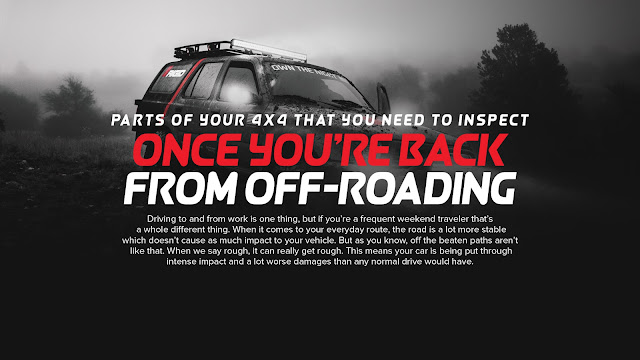Driving to and from work is one thing, but if you’re a frequent weekend traveler that’s a whole different thing. When it comes to your everyday route, the road is a lot more stable which doesn’t cause as much impact to your vehicle. But as you know, off the beaten paths aren’t like that. When we say rough, it can really get rough. This means your car is being put through intense impact and a lot worse damages than any normal drive would have.
Therefore, it’s important that your 4x4 is being checked every after trip to see if there are any damages and to get it fixed as soon as possible. Because car issues caused by off-roading can be serious and is not good to continue driving it until fixed.
Breaks
When going on an off-roading, the rubber or steel lines where the brake fluid passes through could get damaged and lead to a leak. Although they’re normally tucked away from harm’s way, all the trail bashing can snag on rocks or brush all the retaining clips or tie-downs that keep it in place. The thing is, this damage could only lead to a slow leak which is why you need to check your brake lines as soon as you get home. Otherwise the slow leak will give you a false sense of security and may get you in trouble at the most inopportune time.
Engine Compartment
In the engine compartment, check for leaks from the power-steering pump and hoses (if your vehicle’s power steering is a hydraulic system). Look for slow leaks, too, in the cooling system—undetected, they may cause a catastrophic engine failure due to overheating.
If you have not installed a wading kit, it’s always best to inspect your engine and transmission oil for contaminants. If you’ve just done some really serious water crossing or if you’ve been driving through fine sand, have the differential axle lubricated as soon as you can to avoid bearing failure. Drain and replace fluids as soon as possible.
Electrical Wirings
If your 4x4 is fairly new, this may not be as much of a concern. Although, it wouldn’t hurt to play it safe and still check anyways. But for older cars that have been through a lot of off-roading, you really need to check electrical wiring regularly to see if their insulation coating has not been rubbing on steel body parts. Why? Because when that happens and electrical fire can break out which will not only cost you your vehicle but also could hold your next trip back.
Tires
Since off-roading is a lot rougher than your usual daily drive, the tires take in a lot of impact. So always check the sidewalls for possible lumps right away. If it’s there, then your carcass is already broken and will probably bursts in just a matter of time if you continue to drive it in that condition.
Since this isn’t your usual daily commute where I’m assuming you’re driving on concrete, you should invest in mud tires as well. You’ll be surprised how correct tires for off-roading can actually make the experience a whole lot better in terms of driving and longevity of the tires. Just imagine how much bruise, impact and cuts your regular tires will have to take which can prematurely damage the tires beyond repair. Buying new tires all the time can cost a lot compared to purchasing mud tires for your road trips. These mud tires are designed to improve clearance of both sand, dirt, and mud, for ultimate performance, no matter the conditions. Plus, the formula is made to deliver traction, specifically for off-road driving.
Unusual Vibration
Frequent off-roading can cause a lot of different damages to your car. It can cause broken engine or transmission supports, misaligned wheels (especially on vehicles with independent front suspension setups), damaged propeller shafts, or unbalanced tires due to balancing weights getting knocked off the wheels. One tell-tale sign of those damages is unusual vibrations. So if you noticed that after you’ve come back from your trip then make sure you take your car to your trusted car repair shop. This will keep any issues from going unattended and causing even bigger damages. Even mud buildup inside the wheels will definitely get your wheels and tires unbalanced, too, and cause some mild to serious wobbling when you’re back on the road. So make sure you check and get the problem taken care of while it’s still simple like that.
Rubber Components
Especially on high-mileage vehicles, inspect the rubber components used to insulate the undercarriage components to ensure there is no metal-to-metal rubbing.
Yes, all the mentioned potential problems are worrying. However, a 4x4 is still designed for such rough conditions so it would be pointless to try and baby your car too much or avoid off-roading all together. Sure, scratches and dents are heart breaking for any car owner but that’s given and the bare minimum damage a 4x4 gets when off-roading. No matter how careful you drive, you can only minimize them at best but not entirely avoid them.
If you really can’t stomach those risks then maybe it’s time to consider if off-roading is for you or you should look for a different hobby. Do understand that a lot of people subject their four-wheel-drive vehicles to this kind of use, not abuse, because it’s part of their job in fields like mining, surveying, and so on. If you do have to use your vehicle in difficult conditions and are concerned about the warranty, read your owner’s manual and understand the limitations of your vehicle’s warranty.


Walang komento:
Mag-post ng isang Komento